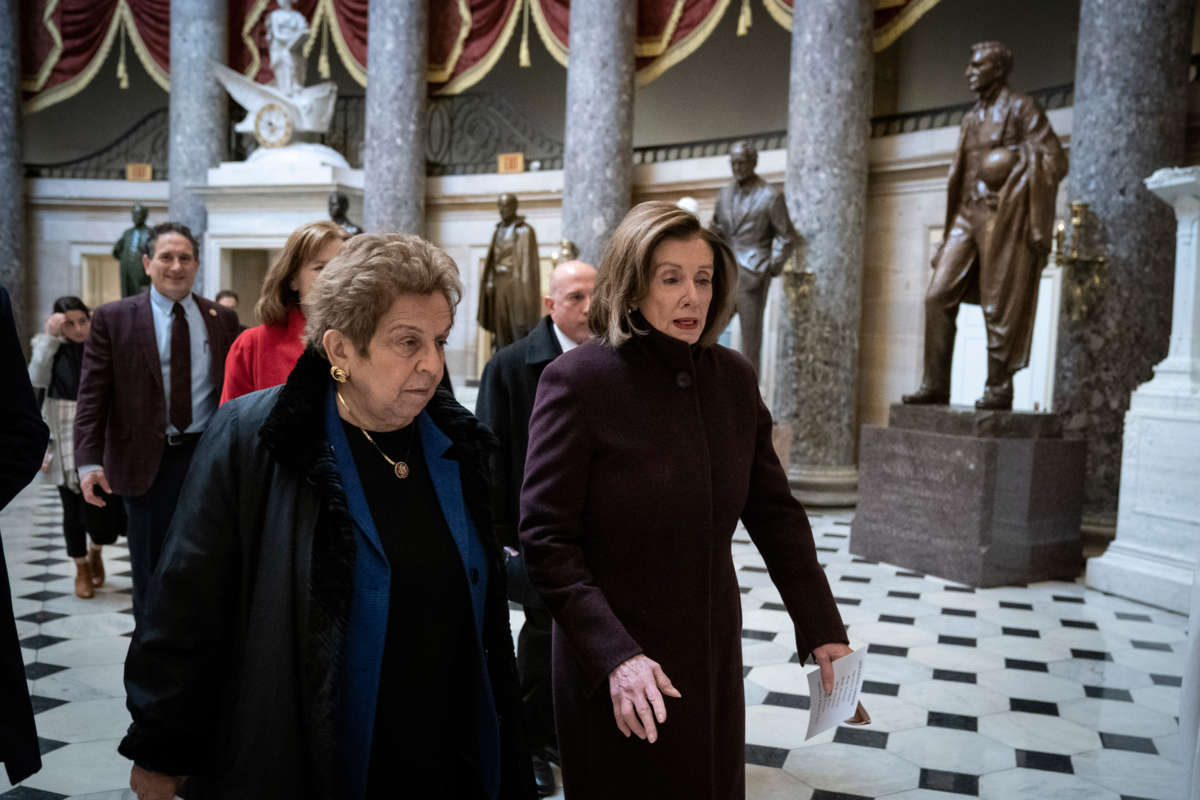Support justice-driven, accurate and transparent news — make a quick donation to Truthout today!
Rep. Katie Porter, a freshman California Democrat and consumer finance expert who quickly made a name for herself in Washington with viral grillings of corporate big-wigs, actively lobbied for a seat on the new congressional committee tasked with overseeing the Trump administration’s handling of a multi-trillion-dollar coronavirus bailout fund.
But House Speaker Nancy Pelosi (D-Calif.) has instead decided to appoint her friend Rep. Donna Shalala (D-Fla.), a freshman with ties to corporations that will likely receive taxpayer bailout money, to fill the role — despite her reported lack of interest in the job.
As The American Prospect’s David Dayen wrote Saturday after Pelosi announced her selection for the spot on the Congressional Oversight Commission, Shalala — unlike Porter — “has no expertise in the financial industry or the Fed.”
“The two committees that would prepare you for this position are Financial Services and Oversight (Porter sits on both),” Dayen noted. “Shalala sits on Education and Labor and Rules. She’s on the early childhood education subcommittee, so if that ever comes up in discussing the Fed’s corporate bond or high-yield ETF purchases we’re in good shape.”
“These are deliberately complex programs that require for oversight someone with a passing familiarity with the financial system and corporate America,” added Dayen, who said Shalala’s appointment “makes a mockery” of the oversight panel.
Particularly troubling are Shalala’s connections to companies that are well-positioned to benefit from the massive bailout fund established by the CARES Act, which President Donald Trump signed into law last month. Dayen ran through Shalala’s long list of corporate ties:
In Shalala’s most recent financial disclosure, dated May 2019, she lists share ownership in an array of companies that will be at the front of the line for a bailout. She holds shares in Boeing, as well as Alaska Airlines and Spirit Aerosystems, which builds a lot of pieces of Boeing aircraft. She owns Chevron, ConocoPhillips, Royal Dutch Shell, and Occidental Petroleum at a time of a historic crash in oil prices. She owns entertainment stock in Paramount, Live Nation, and AMC Theaters, the latter almost certainly headed to bankruptcy. She owns Choice Hotels; nobody’s staying in hotels. She owns TripAdvisor; nobody’s taking trips. She owns retailers and retail producers Ralph Lauren, L Brands, Burlington Stores, and Five Below; retail’s in trouble (she’s also got Walmart, so she’s OK there). She owns big banks JPMorgan Chase, Wells Fargo, Bank of New York Mellon, BBVA Compass, and HSBC.
Others also raised alarm at Pelosi’s selection of Shalala over Porter for the five-member oversight committee.
“The reason not to have Katie Porter do this job is so that the job doesn’t get done,” tweeted The Intercept’s Ryan Grim.
Jesse Eisinger, senior reporter at ProPublica, called Pelosi’s appointment of Shalala “mind-bogglingly outrageous.”
“She has millions of dollars of stock in companies that will benefit from no-questions-asked, no-strings-attached Fed support,” Eisinger tweeted.
Pelosi’s appt of Donna Shalala to the Corona oversight panel is mind-bogglingly outrageous. She has millions of dollars of stock in companies that will benefit from no-questions-asked, no-strings-attached Fed support. @ddayen is excellent here:https://t.co/Rqh2hI8Ext
— Jesse Eisinger (@eisingerj) April 19, 2020
Republican congressional leaders also announced their picks for the oversight panel on Friday.
Senate Majority Leader Mitch McConnell (R-Ky.) selected Sen. Pat Toomey (R-Penn.), a friend of the Koch network and U.S. Chamber of Commerce, while House Minority Leader Kevin McCarthy (R-Calif.) chose Rep. French Hill (R-Ark.). The final member must be agreed upon by McConnell and Pelosi.
The three newest members of the committee will join Bharat Ramamurti, who was selected for the role by Senate Minority Leader Chuck Schumer (D-N.Y.). Ramamurti, as Common Dreams reported, has thus far been outspoken about the need for transparency in how the bailout funds are being distributed by the Federal Reserve and Treasury Department.
“The public deserves to know which companies are receiving taxpayer-backed lending through the Fed and on what terms, and to be able to monitor what those companies do after receiving taxpayer support,” Ramamurti wrote in a letter to Fed Chair Jerome Powell and Treasury Secretary Steve Mnuchin last week.
Following Ramamurti’s letter, the Fed announced on Friday that it plans to publicly disclose some information about companies seeking taxpayer bailout money.
“I’m glad the Fed is now working on a plan to publish transactions that use taxpayer-backed funds,” Ramamurti tweeted. “But the Fed needs to provide all the information I requested in my letter yesterday if it’s truly going to provide the information the public deserves.”
A terrifying moment. We appeal for your support.
In the last weeks, we have witnessed an authoritarian assault on communities in Minnesota and across the nation.
The need for truthful, grassroots reporting is urgent at this cataclysmic historical moment. Yet, Trump-aligned billionaires and other allies have taken over many legacy media outlets — the culmination of a decades-long campaign to place control of the narrative into the hands of the political right.
We refuse to let Trump’s blatant propaganda machine go unchecked. Untethered to corporate ownership or advertisers, Truthout remains fearless in our reporting and our determination to use journalism as a tool for justice.
But we need your help just to fund our basic expenses. Over 80 percent of Truthout’s funding comes from small individual donations from our community of readers, and over a third of our total budget is supported by recurring monthly donors.
Truthout has launched a fundraiser to add 460 new monthly donors in the next 8 days. Whether you can make a small monthly donation or a larger one-time gift, Truthout only works with your support.
